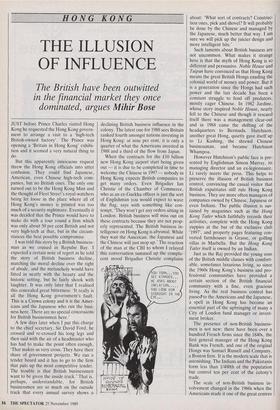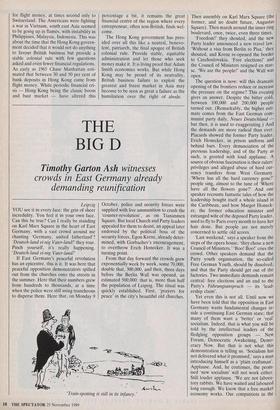HONG KONG
THE ILLUSION OF INFLUENCE
The British have been outwitted in the financial market they once
dominated, argues Mihir Bose
JUST before Prince Charles visited Hong Kong he requested the Hong Kong govern- ment to arrange a visit to a 'high-tech British-owned factory'. The Prince was opening a 'Britain in Hong Kong' exhibi- tion and it seemed a very natural thing to do.
But this apparently innocuous request threw the Hong Kong officials into utter confusion. They could find Japanese, American, even Chinese high-tech com- panies, but no British ones. The only one turned out to be the Hong Kong Mint and the thought of Fleet Street's royal-watchers being let loose in the place where all of Hong Kong's money is printed was too much of a security nightmare. Eventually it was decided that the Prince would have to make do with a tour round a firm which was only about 50 per cent British and not very high-tech at that, but in the circum- stances the best possible compromise.
I was told this story by a British business- man as we cruised in Repulse Bay. I expected a certain note of regret as he told the story of British business decline, matching the moral decline over the right of abode, and the melancholy would have fitted in neatly with the beauty and the historic setting, but he fairly shook with laughter. It was only later that I realised this concealed great bitterness: 'It really is all the Hong Kong government's fault. This is a Crown colony and it is the Amer- icans and the Japanese who run the busi- ness here. There are no special concessions for British businessmen here.'
A few days later when I put this charge to the chief secretary, Sir David Ford, he crossed and re-crossed his long legs and then said with the air of a headmaster who has had to make the point often enough, `That makes us very cross. They have their share of government projects. We run a tender board and it has to go to the firm that puts up the most competitive tender. The trouble is that British businessmen want to be given the inside track.' That is, perhaps, understandable, for British businessmen are so much on the outside track that every annual survey shows a declining British business influence in the colony. The latest one for 1988 sees Britain ranked fourth amongst nations investing in Hong Kong: at nine per cent, it is only a quarter of what the Americans invested in 1988 and a third of the flow from Japan.
When the contracts for the f 1 0 billion new Hong Kong airport start being given out — it is due to be completed in time to welcome the Chinese in 1997 — nobody in Hong Kong expects British companies to get many orders. Even Brigadier Ian Christie of the Chamber of Commerce, who as an ex-Gurkha officer is just the sort of Englishman you would expect to wave the flag, says with something like con- tempt, 'They won't get any orders sitting in London. British business will miss out on these contracts because they are not prop- erly represented. The British business in- telligence on Hong Kong is abysmal. While they wait the American, the Japanese and the Chinese will just mop up.' The reaction of the man at the CBI to whom I relayed this conversation summed up the compla- cent mood Brigadier Christie complains about: 'What sort of contracts? Construc- tion ones, pick and shovel? It will probably be done by the Chinese and managed by the Japanese, much better that way. I am sure we will pick up the juicier design and more intelligent bits.'
Such laments about British business are not uncommon. What makes it strange here is that the myth of Hong Kong is so different and persuasive. Noble House and Taipan have convinced us that Hong Kong means the great British Hongs exuding the colonial world of money and power. But it is a generation since the Hongs had such power and the last decade has been a constant struggle to fend off predators, mostly eager Chinese. In 1982 Jardine, whose story inspired Noble House, nearly fell to the Chinese and though it rescued itself there was a management clear-out and in 1984 came the shifting of the headquarters to Bermuda. Hutchison, another great Hong, quietly gave itself up to Li Kashing, the shrewd Chinese businessman, and became Hutchison Whampoa.
However Hutchison's public face is pre- sented by Englishman Simon Murray, its managing director and an ex-legionnaire. Li rarely meets the press. This helps to preserve the illusion of British business control, convincing the casual visitor that British expatriates still rule Hong Kong business. They are more often managers of companies owned by Chinese, Japanese or even Indians. The public illusion is sus- tained by magazines such as the Hong Kong Tatler which faithfully records their activities, complete with the Hong Kong yuppies at the bar of the exclusive club `1997', and property pages featuring con- verted farmhouses in Grasse, or golfing villas in Marbella. But the Hong Kong Tatler itself is owned by an Indian.
Just as the Raj provided the young sons of the British middle classes with comfort- able, sometimes luxurious living, so since the 1960s Hong Kong's business and pro- fessional communities have provided a certain section of the British financial community with a fine, even gracious living. As the real business control has passed' to the Americans and the Japanese, a spell in Hong Kong has become an essential part of the upbringing of many a City of London fund manager or invest- ment broker.
The presence of non-British business- men is not new: there have been over a hundred French firms since the 1840s, the first general manager of the Hong Kong Bank was French, and one of the original Hongs was Samuel Russell and Company, a Boston firm. It is the modern scale that is astonishing. The Indians and the Pakistanis form less than 1/400th of the population but control ten per cent of the colony's trade.
The scale of non-British business in- volvement changed in the 1960s when the Americans made it one of the great centres for flight money, at times second only to Switzerland. The Americans were fighting a war in Vietnam, south east Asia seemed to be going up in flames, with instability in Philippines, Malaysia, Indonesia. This was about the time that the Hong Kong govern- ment decided that it would not do anything to favour British business but provide a stable colonial rule with few questions asked and even fewer financial regulations. As early as 1965 Chase Manhattan esti- mated that between 30 and 50 per cent of bank deposits in Hong Kong came from flight money. While periodic financial cri- sis — Hong Kong being the classic boom and bust market — have altered this percentage a bit, it remains the great financial centre of the region where every entrepreneur, often non-British, finds wel- come.
The Hong Kong government has pres- ided over all this like a neutral, benevo- lent, patriarch, the final apogee of British colonial rule. Provide stable, equitable administration and let those who seek money make it. It is living proof that Adam Smith economics works. But while Hong Kong may be proud of its neutrality, British business failure to exploit the greatest and freest market in Asia may become to be seen as great a failure as the humiliation over the right of abode.











































































 Previous page
Previous page